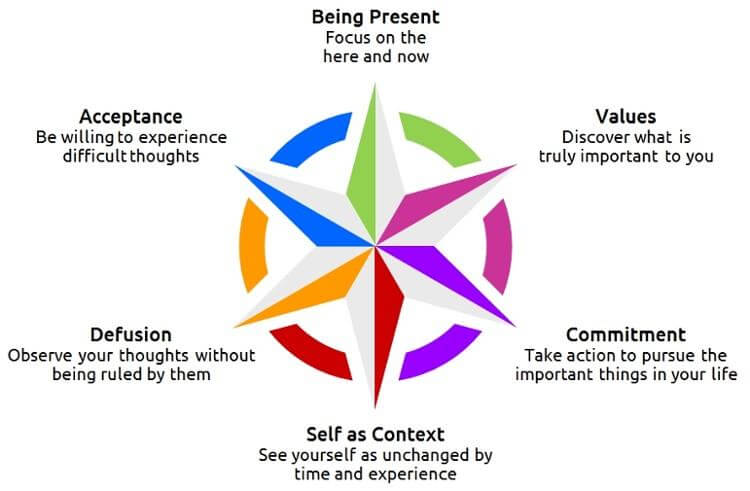What is Act Therapy and How Does It Work?

While reading blogs or articles on mental wellness we often come across a pro-tip that is believed to solve half of our mental health issues and that is Accepting our Emotions rather than Avoiding Them. To begin with, accepting your emotions you can work at a personal level through various tactics and techniques.
But, sometimes the emotions and thoughts become so overwhelming that we need therapy (be it online or offline) to acknowledge them healthily. One such therapy that is found most effective here is Acceptance and Commitment Therapy.
Here is a descriptive analysis of Acceptance Commitment Therapy or ACT Therapy.
What is ACT Therapy (Acceptance and Commitment Therapy)?
ACT is a therapy approach based on Relational Frame Theory (RFT). It was developed by Steven C. Hayes in 1986, with a view that how our language and thoughts influence our internal experiences. This therapy is a perfect combination of behavior, cognitive, and mindfulness-based approaches.
The main focus of this therapy (as proposed by Hayes) is increasing our psychological flexibility
The reason why Acceptance Commitment Therapy is called ACT does not just lie in the fact that it is an acronym of the therapy but it also tells the focus area of the therapy. The focus area of ACT are:

Read More: How to Deal with Your Negative Thoughts?
When is ACT Therapy used?
Acceptance Commitment Therapy is found to be useful in various settings and in uplifting different health conditions. Some of the conditions where ACT is found to be helpful are:
- Managing and treating stress (at the workplace, school, relationship)
- Testing and eliminating anxiety
- Dealing with overthinking and negative thoughts
- Treating in obsessive-compulsive disorder, anxiety disorder, depression, anxiety, and psychosis
- Healing and treating medical health conditions such as substance abuse, chronic pain, and diabetes
Furthermore, research has supported that ACT therapy benefits in all of the conditions mentioned above in an effective manner.
What are the Principles of Acceptance Therapy?
At the heart of Acceptance and Commitment Therapy are the six principles. The composition of these six core principles is also referred to as ACT Hexaflex (refer to the image below).

Principle 1: Diffusion
This principle is aimed at separating unpleasant and unwelcoming thoughts, wishes, desires, memories, and feelings from ourselves. It is achieved by misidentification or taking a step back from them; and see them as mere bits of language passing through, rather than hooking onto them.
Principle 2: Expansion and Acceptance
This principle focuses on allowing the unpleasant emotion, thoughts, urges, sensation, and needs to come to us and let them pass by swiftly rather than struggling with them, avoiding them, or giving much focus to them. Harris suggests that this way they move away quickly and effectively, rather than bothering us unnecessarily. This principle of ACT Therapy in psychology focuses on the acceptance of bodily sensations through imaginations and full body-scan.
Principle 3: Contact with the Present Moment
This principle is also referred to as a connection (Harris). The focus here is to be in the moment and experience here-and-now without drifting away from it. But this has to be done with full openness and receptiveness. As Harris suggests with the connection we can engage fully in whatever we are doing.
Principle 4: Observing Self
The key to work on self is observing it. Here you actively engage in two processes- thinking and observing thinking. This principle will help us learn that no urges, thoughts, feelings, and desires are dangerous or controlling. In fact, these all are peripheral aspects of ourselves, are dynamic in nature, and not the essence of who we are.
Principle 5: Values clarification
This principle of life values is commonly assessed by a “life values” questionnaire. As a part of this questionnaire values of the respondent are assessed in ten core domains. The reason why values are considered as part of this therapy is it is believed that our values motivate our values, motivates us, directs us, and allows us to make significant life changes.
Principle 6: Committed Action
The principle is the take action part of the therapy. Here the person sets a goal and takes effective actions to accomplish it. He won’t just sit and think of satisfying his chocolate cake cravings rather he will get up from his comfy sofa, and either bake it or order it (analogy). The aim here is to let the person supply energy and will, to have a rich and meaningful life ahead of him.
Benefits of ACT Therapy
There are numerous benefits that Acceptance and Commitment Therapy has to offer to an individual who undertakes it. This list of benefits that This Therapy includes:
- It develops psychological flexibility
- It makes us aware of our present
- It let us practice self-acceptance in a healthy manner
- It allows us to commit to actions that help us to facilitate or experience
- It prepares us to embrace challenges positively
- It gives an effective life-affirming and inspirational perspective of self-determination
- It builds us strong to acknowledge our thoughts and emotions rather than running away from them or being guilty of them
Overall ACT Therapy helps us to manage our emotions and thoughts rather than controlling them. The former leads to self-healing whereas the latter one creates chaos.
Should You Go for Acceptance Therapy?
Yes, if you think that your emotions, thoughts, urges, and desires are bothering you and you wish to deal with them comprehensively and healthily then going for Acceptance and Commitment Therapy is definitely recommended.
Applying ACT Therapy in Day-to-Day Life
We can apply This Therapy in our daily lives to deal with a few overwhelming emotions. One such case where some aspects of ACT are applied for psychological flexibility is negative thinking. ACT is used in challenging and working with our negative thoughts.
Apart from it, there are various little exercises of acceptance Therapy in psychology that can help us.
Some Interesting Facts:
Here are few interesting facts about Acceptance Commitment Therapy are presented below:
- This Therapy was originally called comprehensive distancing
- A brief version of ACT is called Focused Acceptance and Commitment Therapy (FACT)
- Acceptance Commitment Therapy views many problems as arriving from the acronym of FEAR where,
F: Fusion with your thoughts
E: Evaluation of the experience
A: Avoidance of your experience
R: Reason-giving for your behavior
Acceptance and Commitment Therapy is likely to offer extremely positive results not only for those with chronic mental health conditions but also for those with basic life struggles. Do try ACT Therapy for yourself.
Do let us know in the comment section below what your views are on Acceptance and Commitment Therapy or if there is another aspect of it that you would want us to cover.
Thanks for reading.
Other Interesting Topics-
Releasing Stress Through Karate Breathing Techniques.




















